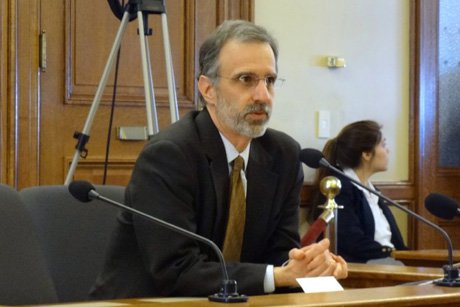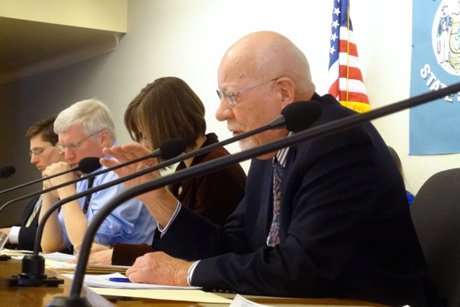The author of the bill didn't even know what the federal minimum wage was, much less the living wage in Milwaukee and Dane counties.
As living wage campaigns are succeeding in cities and counties across the country, corporate profiteers are fighting back. They are pushing legislation at the state level that would ban local governments from enacting ordinances that pay higher than the minimum wage. They don't want local taxpayers to be allowed to ensure that workers are provided with a wage that enables them to meet their most basic needs.
In Washington State, where the minimum wage of $9.32 an hour is the highest in the country, Seattle officials are working out a plan to enact a living wage ordinance of $15/hour. Meanwhile, in Wisconsin, where the corporate stranglehold of the state legislature intensifies as the session draws to a close, extreme rightwing legislators attempted to push through a law based on a model bill written by the American Legislative Exchange Council (ALEC) that would put an end to any local unit of government's attempt to secure decent wages and conditions for workers in their jurisdictions.

Photo: Dane County Executive Joe Parisi testifying against SB 626.
For the more than 140 cities and counties throughout the country that already have such ordinances on the books -- including Milwaukee and Dane Counties in Wisconsin -- living wage ordinances are a vital part of larger economic development plans that are based on residents having disposable income to spend. Opponents of the living wage ordinances claim they have a chilling effect on job creation and cause an increase in property taxes, but those claims have not been borne out in reality.
But reality doesn't seem to concern the ideologues pushing the measure, SB 626, through the Wisconsin state senate. In fact, the bill's author, Rep. Chris Kapenga (R-Delafield) who represents one of the wealthiest districts in the state, doesn't even know what the federal minimum wage is, let alone the local living wages his bill is targeting, as he confessed during a recent public hearing.

Photo: Sen. Fred Risser during the Senate committee hearing on SB 626.
Kapenga was elected in 2010 when, in the wake of the Citizens United vs. FEC, a tidal wave of dark money swept Tea Party-supported candidates into state government. He says he's qualified to push a bill affecting nearby Milwaukee because he drives through the city everyday, and employs people from there.
Calling them "inflated wage ordinances," in a recent hearing on the bill Kapenga said the efforts of local governments to raise workers out of poverty should not be funded by state taxpayers. He actually invoked the Boston Tea Party in response to a question from Sen. Nikiya Harris (D-Milwaukee), who asked: "How is this a local control bill and not a control of locals bill?"
Senate co-sponsor Sen. Glenn Grothman (R-West Bend) went on at length about how taxpayers in the counties surrounding Milwaukee -- the wealthiest in the state -- "are forced to give their tax dollars to Milwaukee County, as well as the City of Milwaukee, as well as the Milwaukee School District."
Grothman, upon whose office door hangs a Gadsden flag reminding all visitors of his extreme libertarian leanings, conveniently leaves out of his analysis the fact that the wealth of Waukesha, Ozaukee and Washington Counties has been built in part on the poverty wage labor of people who live in Milwaukee.
Grothman's justification was a thinly veiled racist attack on the people who have borne the enormous socio-economic impacts of de-industrialization in the region, and who have been the guinea pigs for an austerity agenda that includes school and social service privatization for the past thirty years: "It is a little bit frustrating, after the citizens of Waukesha, Washington and Ozaukee are asked to work and give and give and give to Milwaukee County, Milwaukee County would turn around and take the dollars that are being contributed by the citizens of the outlying counties, and then turn around and force their contractors to give wages higher than those being paid in our three counties."
The speeches of Grothman, Kapenga and other Republican supporters of the companion bill that passed the state Assembly on a party line vote last month, AB 750, seem directed not at their constituents or the people of Wisconsin, but rather appear to be messages to potential campaign donors in this election year. Their public declarations of "no taxation without representation" close a magical circle of influence between corporate billionaires, the think tanks they fund, and the political operatives they purchase with dark campaign money in state legislatures.
Proponents of SB 626/AB 750 cite a Fraser Institute report that concludes that living wage ordinances have a negative impact on overall employment and inflate municipal budgets whose costs are passed on to taxpayers. The Koch brothers have been big supporters of both the Fraser Institute as well as extreme rightwing politicians from Wisconsin.
The popular response to this measure has been sharp and intense. Dane County Executive Joe Parisi blasted Kapenga's claim that counties and cities could still pass living wage ordinances, they just couldn't use state or federal revenues to fund them. Speaking of county workers who provide personal care services in nursing homes and home care settings, Parisi said, "You can't separate out those dollars. Human services are funded through federal, state, local levy. You can't separate that out." Referencing the disparity between the federal minimum wage of $7.25/hour and Dane County's living wage of $11.33/hour he said, "Yes, (SB 626) will take $4 an hour out of the pockets of people who care for the most vulnerable members of our society."
Sen. Fred Risser (D-Madison) cut to the heart of the matter: "If you put state money into helping low income people, then that state money is going to go back into local and state economies. You give extra state money to the rich and it goes down to the Cayman Islands!"
Pointing out the political influence purchased by Milwaukee County contractor Sally Sprenger, owner of Supportive Home Care Options who was the only member of the public testifying in support of the bill, Jennifer Addison-Epps, Executive Director of Wisconsin Jobs Now said that Sprenger "gave nearly $50,000 to GOP politicians in the last year, including several thousand dollars in legal bribes to a member of this committee — Sen. Leah Vukmir. Sally Sprenger has donated more to Republicans in the last year than most of her workers could earn in more than three years."
Richard Russell, a retired state worker, called SB 626 "the pettiest, cheapest, cruelest, most venal, cold-hearted and mean-spirited pieces of legislation that was ever confronted before the Wisconsin State Legislature." He went on, "I hope you all consign it to the deepest hole of hell where it will only see the light of day if we ever decide that we don't really want to be a society that gives a damn about its individual citizens."
The bill passed out of committee on a party-line vote yesterday, but its prospects look dim in the full Senate. Majority Leader Scott Fitzgerald (R-Juneau) told reporters that a few members of his caucus were not ready to vote for SB 626, and it would likely not make it to the floor before the end of this legislative session.
Whether or not the measure makes it to the Senate floor for the vote, the underlying forces promoting it aren't going away. Neither are the people who are standing up to defend humane values and the commons.
Rebecca Kemble is a writer and political reporter for The Progressive. She is also the president of the U.S. Federation of Worker Cooperatives and the president of CICOPA North America. She is a member of Union Cab Cooperative and is a founding member, writer, and editor in the Wisconsin Citizens Media Cooperative.
